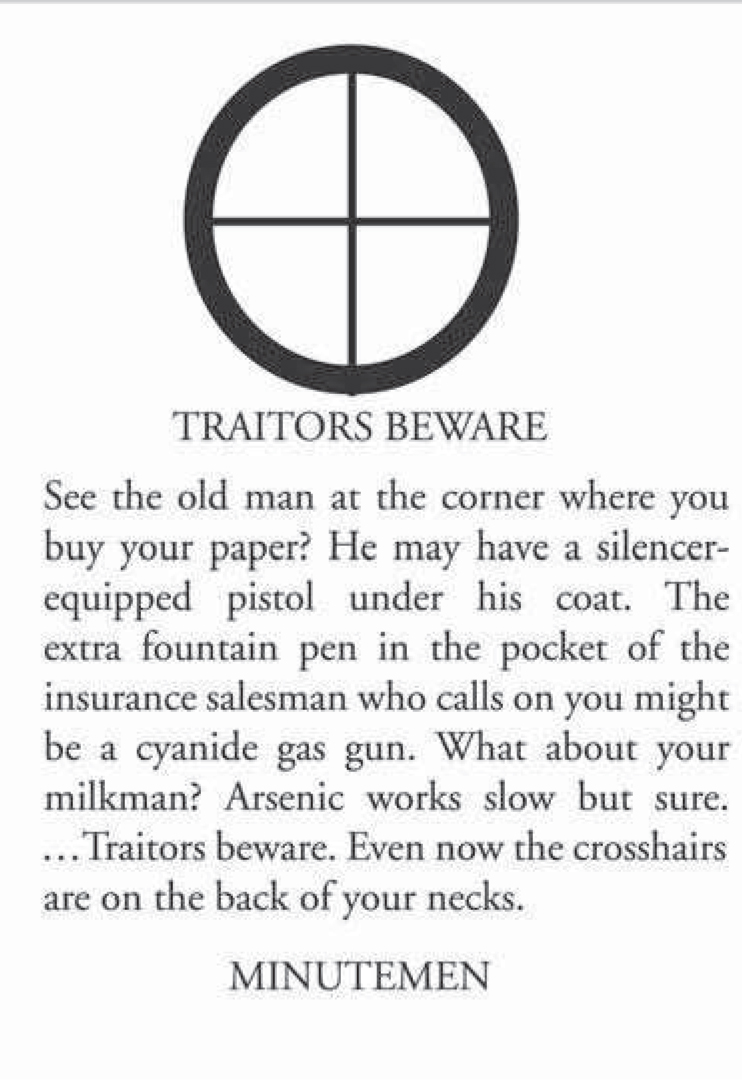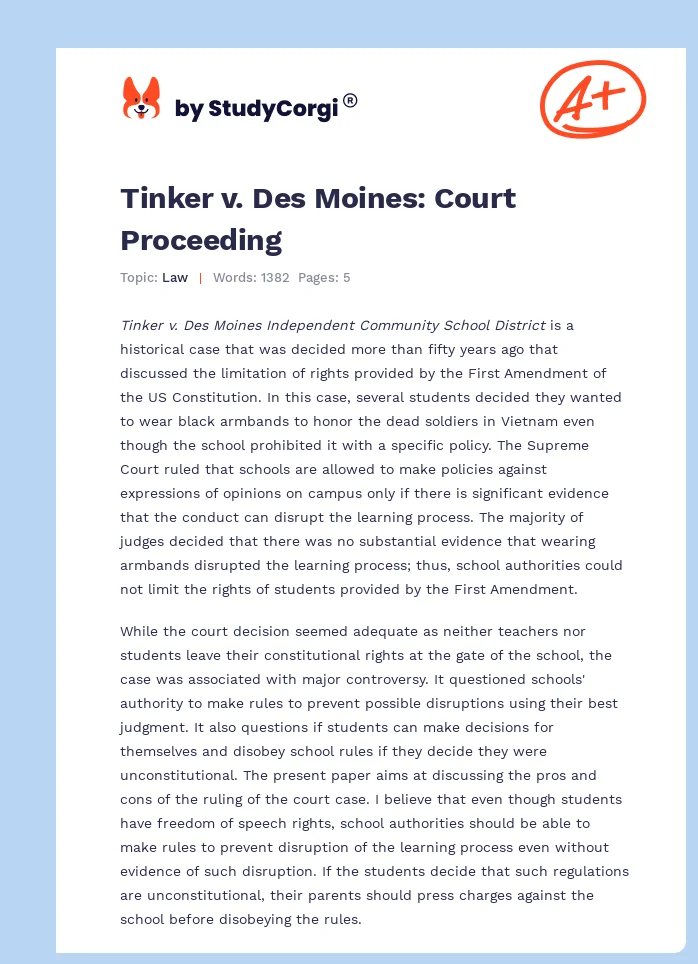Tinker v. Des Moines Independent School District is a landmark case addressing the free speech rights of public school students. In Tinker, a group of high school students wore black armbands to school to protest the Vietnam War.The students were disciplined by the school for wearing the armbands, and the students filed a lawsuit arguing that their armbands were a form of symbolic protest
Tinker v Des Moines (1969) | Academy 4SC
Tinker v. Des Moines Independent Community School District. Media. Oral Argument – November 12, 1968; Opinions. Syllabus ; View Case ; Petitioner Tinker . … Justice Hugo L. Black wrote a dissenting opinion in which he argued that the First Amendment does not provide the right to express any opinion at any time. Because the appearance of the

Source Image: coursehero.com
Download Image
VIDEO CLIP 10: Tinker v. Des Moines– The Dissenting Opinion (2:03) Describe the arguments that Justice Hugo Black made in his dissenting opinion.

Source Image: landmarkcases.org
Download Image
Tinker v. Des Moines: Court Proceeding | Free Essay Example In Tinker v. Des Moines Independent Community School District, the Supreme Court ruled that students have the right to express their political views through symbolic speech, such as wearing black armbands, as long as it does not cause a substantial disruption to the school environment. The dissenting judge argued that the armbands caused

Source Image: haikudeck.com
Download Image
Who Wrote The Dissenting Opinion In Tinker V Des Moines
In Tinker v. Des Moines Independent Community School District, the Supreme Court ruled that students have the right to express their political views through symbolic speech, such as wearing black armbands, as long as it does not cause a substantial disruption to the school environment. The dissenting judge argued that the armbands caused Tinker v. Des Moines Independent Community School Systems (1969) was a Supreme Court case famous as a foundational case on protecting first amendment rights of students at publicly funded schools. The case arose when school administrators expelled five students for wearing black armbands to school that at the time symbolized opposition to the Vietnam War.
Case Analysis by Brian Gray
Feb 17, 2024Tinker v. Des Moines Independent Community School District, case in which on February 24, 1969, the U.S. Supreme Court established (7-2) the free speech and political rights of students in school settings. On the basis of the majority decision in Tinker v.Des Moines, school officials who wish to regulate student expression must be able to demonstrate that student expressive activities would Obscenity Case Files: Tinker v. Des Moines Independent Community School District – Comic Book Legal Defense Fund

Source Image: cbldf.org
Download Image
CQ Researcher – Student Rights Feb 17, 2024Tinker v. Des Moines Independent Community School District, case in which on February 24, 1969, the U.S. Supreme Court established (7-2) the free speech and political rights of students in school settings. On the basis of the majority decision in Tinker v.Des Moines, school officials who wish to regulate student expression must be able to demonstrate that student expressive activities would

Source Image: cqpress.sagepub.com
Download Image
Tinker v Des Moines (1969) | Academy 4SC Tinker v. Des Moines Independent School District is a landmark case addressing the free speech rights of public school students. In Tinker, a group of high school students wore black armbands to school to protest the Vietnam War.The students were disciplined by the school for wearing the armbands, and the students filed a lawsuit arguing that their armbands were a form of symbolic protest

Source Image: academy4sc.org
Download Image
Tinker v. Des Moines: Court Proceeding | Free Essay Example VIDEO CLIP 10: Tinker v. Des Moines– The Dissenting Opinion (2:03) Describe the arguments that Justice Hugo Black made in his dissenting opinion.

Source Image: studycorgi.com
Download Image
If a Supreme Court Justice were to disagree with the majority opinion, which issue would be most important – brainly.com Des Moines– The Dissenting Opinion. Tinker v. Des Moines– The Dissenting Opinion. In discussing the 1969 landmark Supreme Court Case Tinker v. Des Moines, Erik Jaffe, Free Speech and Election Law

Source Image: brainly.com
Download Image
Supreme Court Case of Tinker v. Des Moines In Tinker v. Des Moines Independent Community School District, the Supreme Court ruled that students have the right to express their political views through symbolic speech, such as wearing black armbands, as long as it does not cause a substantial disruption to the school environment. The dissenting judge argued that the armbands caused
:max_bytes(150000):strip_icc()/GettyImages-515103084-5be5bce646e0fb0026a6b18c.jpg)
Source Image: thoughtco.com
Download Image
C-SPAN Landmark Cases | Season Two – Home Tinker v. Des Moines Independent Community School Systems (1969) was a Supreme Court case famous as a foundational case on protecting first amendment rights of students at publicly funded schools. The case arose when school administrators expelled five students for wearing black armbands to school that at the time symbolized opposition to the Vietnam War.

Source Image: landmarkcases.c-span.org
Download Image
CQ Researcher – Student Rights
C-SPAN Landmark Cases | Season Two – Home Tinker v. Des Moines Independent Community School District. Media. Oral Argument – November 12, 1968; Opinions. Syllabus ; View Case ; Petitioner Tinker . … Justice Hugo L. Black wrote a dissenting opinion in which he argued that the First Amendment does not provide the right to express any opinion at any time. Because the appearance of the
Tinker v. Des Moines: Court Proceeding | Free Essay Example Supreme Court Case of Tinker v. Des Moines Des Moines– The Dissenting Opinion. Tinker v. Des Moines– The Dissenting Opinion. In discussing the 1969 landmark Supreme Court Case Tinker v. Des Moines, Erik Jaffe, Free Speech and Election Law